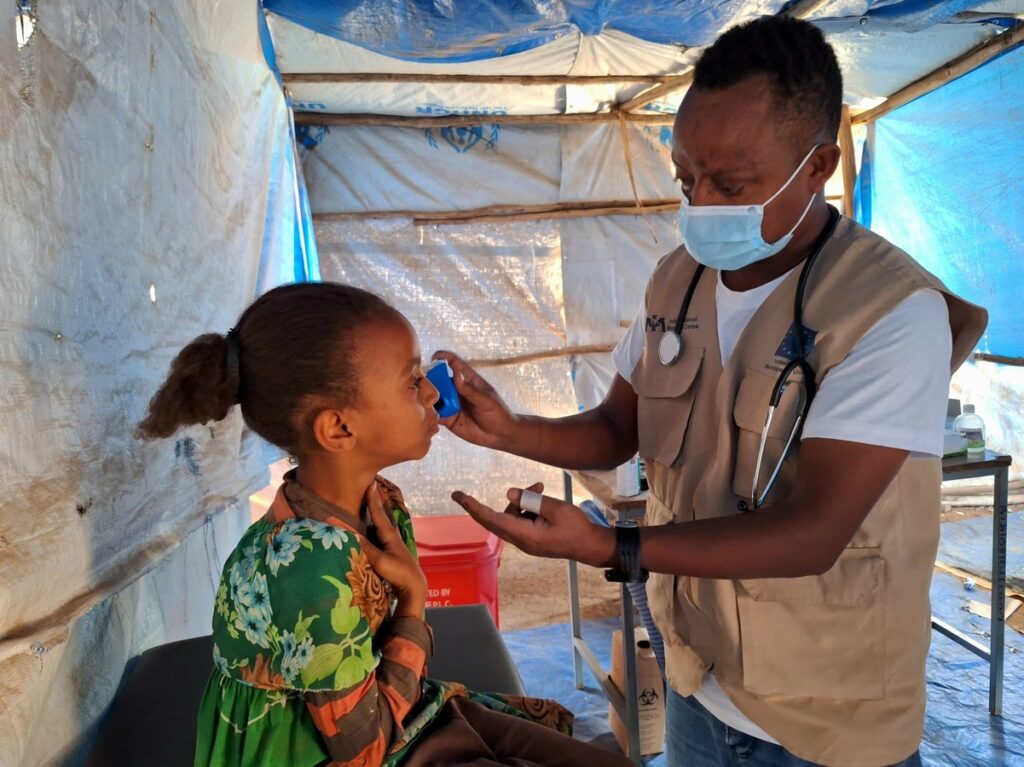Half of the world’s population lacks access to essential health care — and you have the power to change that. A donation at work toward global health can provide the safe delivery of a newborn baby, the ready-to-use therapeutic food that nourishes a child and brings them back to health, the medical care that saves someone’s life after a disaster hits, or the supplies that cure treatable illnesses. Our partners Americares, International Medical Corps, Medical Teams International, Orbis International, Partners in Health, and UNICEF USA are on the ground providing lifesaving interventions for people in need around the world, thanks to generous donations from global champions like you. Read on for inspiring stories of our partners’ work and consider donating to them through your workplace giving campaign.
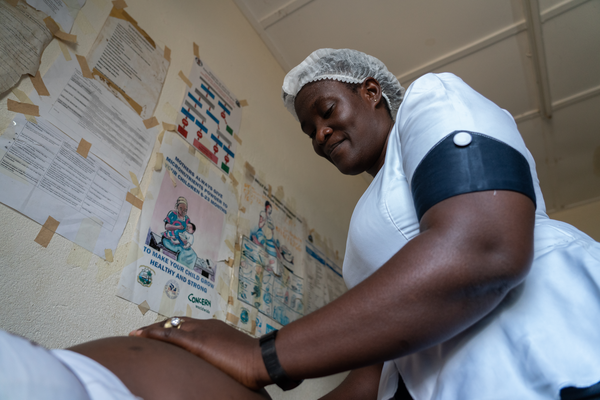
Every mother wants the same thing after giving birth: to hear their baby cry, proof that their newborn has taken their first, lifegiving breath. Martha, a young mother in rural Grand Bassa, Liberia, did not hear a wail; her tiny boy was limp, blue, and not breathing. Instead, she heard midwife Roseline Williams move quickly, bringing supplies and beginning actions to resuscitate her newborn son. Then — a cry. “I was happy when I heard the baby,” says Martha. “I am so very grateful to clinic staff for enabling me to take my baby home alive.”
The Compound #3 health center where Martha received care is one of six clinics participating in Americares maternal health programs. Williams and 26 other supervisors and health workers received in-person training on safe birth, and three clinics receive monthly mentoring visits by Americares staff, a full set of neonatal resuscitation equipment, a mannequin for routine skills practice, and other essential newborn supplies. This combination of training, mentoring, and supplies directly addresses Liberia’s high infant mortality rate. In six months, Americares training boosted the quality-of-care rating at the clinics from a 27% rating to 83%, on average. “Because of Americares training, we were able to make that baby survive,” says Williams.
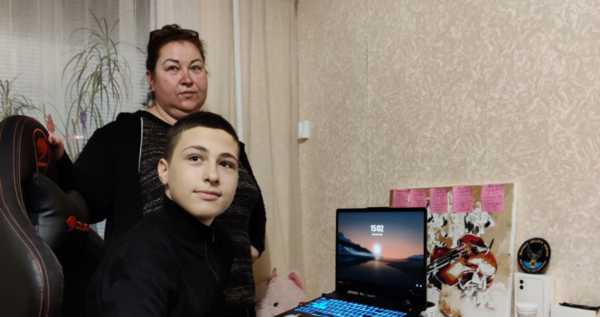
Illya is a 14-year-old boy from a low-income household who lives with his mother in Mykolaiv city, Ukraine. He was diagnosed with Gaucher disease (a rare genetic disorder) as a child. To slow down the progression of the disease and to prevent complications, he needs to take medications regularly. But he ran out of medicines during the war, and the family didn’t get any support from the government, as all government resources were allocated to the fighting. And Illya could not purchase the medicines in bulk as they were too expensive.
Recognizing the urgent need for cash assistance, the Mykolaiv Regional Department of Health reached out to International Medical Corps for help. International Medical Corps conducted a careful analysis to identify patients most in need of support, and after a thorough evaluation, provided cash to 49 patients with chronic conditions who did not have the financial resources to seek treatment externally. Illya was one of them. With the money he received, he could purchase his medication. Illya’s mother, Natalya Oleksienko, expressed her gratitude to International Medical Corps. “The cash assistance provided by the organization has supported our family in purchasing the much-needed medicines for my son, and he can continue his treatment without delay.”
Medical Teams International
When we think of wellbeing, physical health usually comes top of mind. But mental health, which isn’t as easy to evaluate as physical health since there aren’t usually visible wounds, is just as important. Medical Teams psychologist, Christina, shares about what led her to work with refugees in Lebanon and why caring for their mental health matters. This video is just one example of Medical Teams International’s expertise in refugee health care, disaster relief, and mobile dental programs locally and internationally.
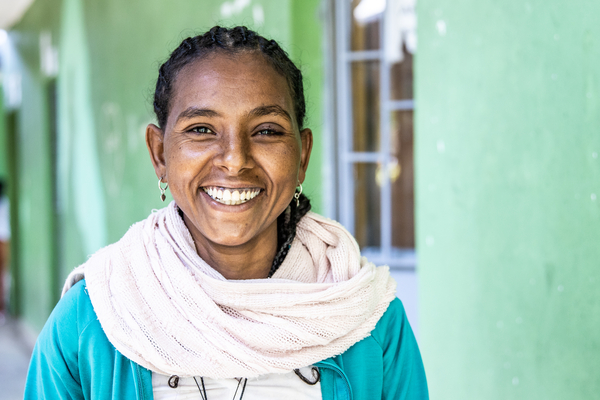
In the heart of Gurage, Ethiopia, Fikir, 28, a dedicated biology teacher and loving mother of two boys, shares her journey battling the devastating effects of trachoma. Trachoma, an easily preventable bacterial eye infection, remains a significant cause of blindness in rural Ethiopia. Fikir’s experience with trachoma began at a young age, but it wasn’t until university that a friend noticed she had trachomatous trichiasis (TT), a condition where eyelashes turn inward as a result of repeat trachoma infections, causing excruciating pain and, if untreated, irreversible vision loss or blindness.
Fikir’s story is one of resilience and hope as she underwent surgery for her TT at the Worsherbe Health Center, thanks to the intervention of Orbis-trained health workers. “I have had repeated infections from trachoma since I was very young,” Fikir recounts. “I didn’t know this was bacteria or trachoma. It kept coming back.” Despite the pain and discomfort caused by TT, Fikir persisted, finding solace in the support of her husband and her dedication to teaching biology to high school students. However, the disease’s impact extended beyond her own suffering, affecting her students and even her own children. “Both of my boys are showing signs of redness and discharge,” she says. “I brought them to a health center already.” Despite the challenges, Fikir remains hopeful for the future, eagerly anticipating the day when she can see without discomfort and when trachoma is no longer a threat to her community. “After my stitches are removed, I am looking forward to being independent once again and seeing the bright light,” Fikir expresses with optimism. “I am very thrilled to get this service for free. I am very happy. I don’t want to see anyone suffer from this pain ever again, so I will be happy to see trachoma gone.” Fikir’s journey is a testament to the transformative power of access to health care and the unwavering determination of individuals like her to overcome adversity and build a brighter future for themselves and their communities.
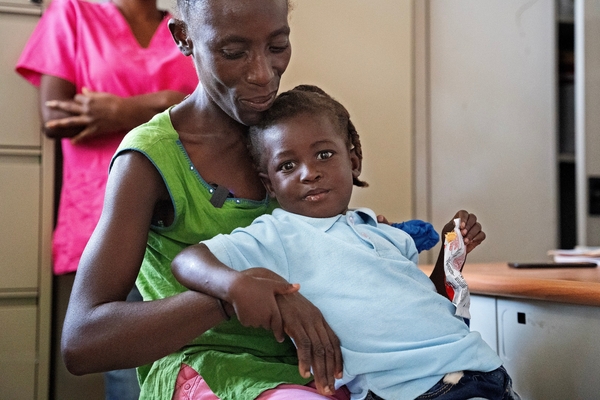
In Haiti, the number of children suffering from severe acute malnutrition has drastically increased during this time of widespread violence and political and economic instability, as food prices have skyrocketed and resources have become even more limited. At Zanmi Lasante, as Partners In Health is known in Haiti, the nutrition team provides screening, treatment, and education to respond to this crisis. The program serves patients, typically infants, children from 6 months to 5 years old, and pregnant or breastfeeding women, through clinic visits and through mobile clinics conducted in the surrounding communities.
Jolène, a mother of five, felt powerless when her youngest son, three-year-old Raphaël, fell extremely ill last August. He couldn’t stop vomiting, his belly was swelling, he was covered in rashes, and he was deteriorating as he rapidly lost weight. When Jolène brought him to the Zanmi Lasante team for help, he was immediately hospitalized: Raphaël was suffering from severe malnutrition. “I was very affected by his illness. I had no hope at all. I thought I had lost him,” recalls Jolène. Raphaël’s condition was severe and required him to remain hospitalized for three months until he regained his strength. Today, he continues outpatient treatment with the Zanmi Lasante team monitoring his progress and supporting his nutrition, and his mom is committed to never missing an appointment. Zanmi Lasante’s nutrition program provides children with a lifesaving treatment called Nourimanba. This ready-to-use therapeutic food, produced by Zanmi Lasante in partnership with local farmers, helps children gain weight and grow quickly over several weeks of care. Raphaël is just one of the thousands of children who have been saved by this food.
Meet Musa, 6, who suffered a head injury during the Turkey earthquake when a wall collapsed on top of him, and learn how UNICEF supported him on the road to recovery — just one aspect of UNICEF’s massive global emergency response system. Well before emergencies even arise, UNICEF is on the ground assessing risks, identifying vulnerabilities, and working to fortify public health and other essential systems. A 24/7 global operations center stays on alert, constantly monitoring conflicts, migration, and weather patterns, as well as the locations of staff and supplies, leveraging that intel to stay prepared and to preposition emergency items like water purification tablets, medical equipment, hygiene kits, and learning materials. Anything shipped from UNICEF’s humanitarian warehouse in Copenhagen, the world’s largest, can reach anywhere in the world in under 72 hours. UNICEF stays on long after a crisis too, to support recovery and help build resilience.
You can take action and advance global health efforts by donating to Americares, International Medical Corps, Medical Teams International, Orbis International, Partners in Health, and/or UNICEF USA through your workplace giving campaign.
Thank you Americares, International Medical Corps, Medical Teams International, Orbis International, Partners in Health, and UNICEF USA for providing content for this blog.

